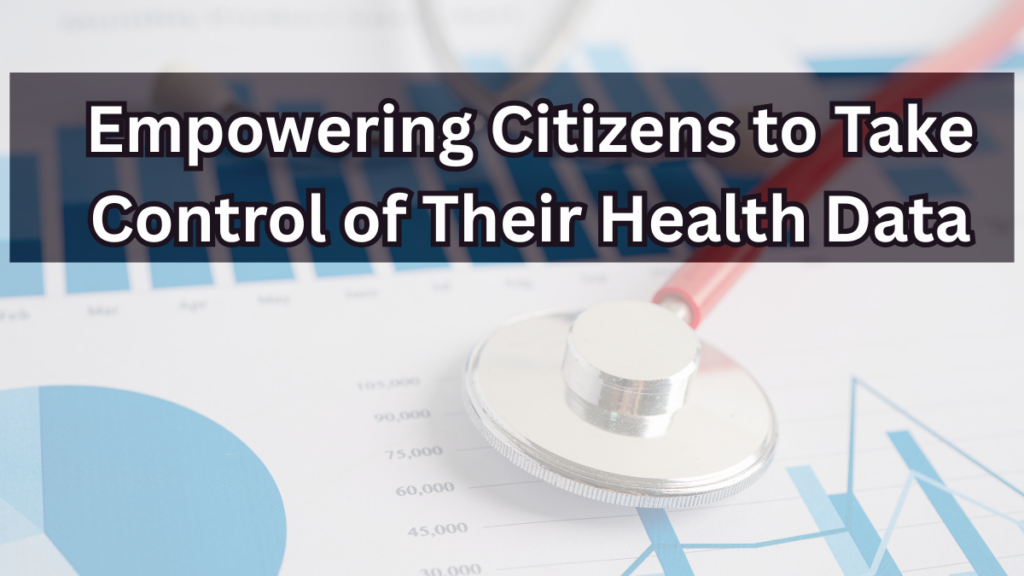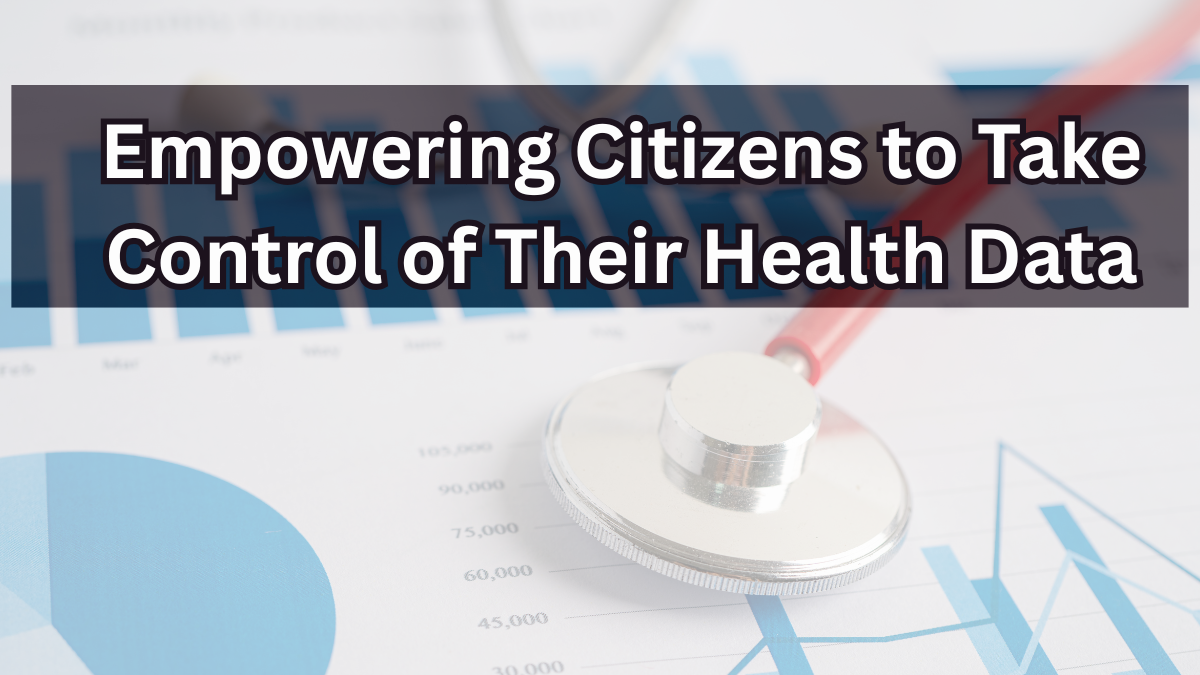India, with its massive population of 1.4 billion, is a country of vast potential and untapped opportunities, especially when it comes to data. In fact, India’s population exceeds that of the entire bloc of 38 OECD countries combined. As technology continues to advance at an accelerated pace, the data generated by Indian citizens through daily interactions, digital services, and transactions is growing rapidly.
This data could soon rival that of OECD countries in terms of value, especially when adjusted for purchasing power parity. The question, however, is whether India’s data governance policies are evolving quickly enough to manage this massive data ecosystem. This article explores the current challenges in India’s healthcare data system and argues for a citizen-centric data governance approach that empowers individuals and unlocks the potential of health data.

The Challenge of Data Governance in India
As India moves closer to becoming a global data powerhouse, policymakers face significant challenges in formulating effective data governance strategies. A fundamental issue arises from a misunderstanding between data as a form of identity and data as a form of property. This confusion is not only holding back India’s progress in data management but is also preventing the country from harnessing the full potential of its data-driven economy, particularly in healthcare.
Key Issues in India’s Healthcare Data System
-
Fragmented Digital Infrastructure:
-
Private Hospitals: Large private hospitals in India have implemented sophisticated digital systems to manage patient data. However, this is not the case across the entire healthcare system.
-
Small Private Clinics: A large portion of India’s healthcare services are provided by small private clinics. These clinics often lack the incentive or the resources to implement digital record-keeping systems, leading to fragmented data that isn’t interoperable across different healthcare providers.
-
Government Hospitals: Although the National Health Mission has pushed for digitalisation, government hospitals often face resource constraints, hindering the implementation of comprehensive digital solutions.
-
-
Inability to Compete on Pricing:
-
Without access to comprehensive healthcare data, insurance companies struggle to offer competitive pricing. This lack of transparency in healthcare costs further exacerbates inequality in access to affordable healthcare.
-
-
Hindered Research & AI Innovation:
-
The absence of large, accessible healthcare datasets limits clinical researchers’ ability to run large-scale studies that could uncover new treatments. Similarly, AI researchers are unable to train diagnostic tools or decision support models on rich datasets, hampering innovation in the medical field.
-
Current Efforts to Improve Healthcare Data Access
The National Health Authority (NHA), recognising the importance of a digital health infrastructure, has laid out a framework to improve data exchange across healthcare providers. The Ayushman Bharat Digital Mission (ABDM) is the cornerstone of this initiative and aims to facilitate the smooth transfer of health data across the country.
ABDM’s Key Features:
-
Health Registries: A series of databases for doctors, drugs, and healthcare facilities to standardise and track information.
-
Middleware: This technological layer processes and ensures that data flows smoothly between different healthcare systems, helping maintain consistency and reliability.
-
Consent Management System: This feature allows patients to give informed consent to share their health records with registered healthcare providers, ensuring that patients maintain control over their data.
Despite these initiatives, the healthcare data system in India faces a fundamental challenge: neither the patient nor the doctor is currently incentivised to think about the future value of the health data generated during a consultation.
The Core Issue: Lack of Incentives for Data Sharing
For healthcare data to become valuable, it needs to be actively shared and made interoperable across the healthcare ecosystem. However, at present, both patients and healthcare providers view health data as isolated pieces of information that are only useful in the moment of care. This lack of foresight prevents data from becoming a shared resource that can benefit both patients and the broader healthcare community.
How to Unlock the Value of Health Data:
-
Empowering Patients: Patients should have the right to decide whether to share their health data with commercial vendors, such as tech companies or insurance providers. By giving patients control over their data, they can choose healthcare facilities that meet the ABDM’s data interoperability standards.
-
Improved Consultation Processes: With accessible and complete medical records, doctors will be able to make more informed decisions, leading to better healthcare outcomes. Additionally, patients will benefit from faster, more accurate diagnoses.
-
Emergence of Data Intermediaries: As the market for health data grows, intermediaries—companies or platforms—will emerge to help facilitate secure and compliant data exchanges. These entities will provide value-added services such as analytics, personalized health advice, and recommendations based on patient data.
The Need for a Free Market for Health Data
A major barrier to the widespread adoption of health data sharing is the misplaced emphasis on privacy. While privacy is undoubtedly important, policies that restrict the sharing of health data often undermine the potential economic benefits that could come from a more open, market-driven approach.
Global Models of Healthcare Data Governance:
-
In the US, the Health Insurance Portability and Accountability Act (HIPAA) restricts patients’ ability to share their health records with third parties, even though anonymised health data is bought and sold by hospitals and insurers for billions of dollars. These transactions benefit corporations, but patients do not share in the economic rewards.
-
In the UK, healthcare data governance is rooted in the idea that healthcare institutions, not patients, own medical records. The National Health Service (NHS) controls nearly 90% of patient data, using it for research and policy decisions. While the UK’s system has some merit, it doesn’t align with India’s healthcare structure, which is more privatised and decentralised.
Citizen-Centric Data Governance: A Better Approach for India
India’s healthcare system, which is highly privatised and decentralised, needs a citizen-centric data governance model. This model would enable citizens to have full control over their health data, viewing it as property that they can share, sell, or use at their discretion.
Key Elements for a Citizen-Centric Data Governance:
-
Privacy Tools: The government and private sector can offer tools that allow individuals to share data while protecting their privacy. These could include technologies like data anonymisation and encryption.
-
Forensics Tools: Digital forensics tools will help ensure that data sharing remains fair and that there are no asymmetries or exploitations in the marketplace.
-
Effective Regulations: While empowering citizens to control their data, India must ensure that clear regulations exist to protect users, especially in cases of data misuse or breach.
FAQs
1. Why is healthcare data so important for India’s future?
-
Healthcare data is crucial for improving medical care, enabling better insurance pricing, supporting clinical research, and fostering AI-driven innovation in healthcare. It can also help identify trends, improve public health strategies, and ultimately reduce healthcare costs.
2. How does the Ayushman Bharat Digital Mission (ABDM) work?
-
ABDM is a national initiative that aims to create a digital health infrastructure. It allows citizens to access their health records across different providers, ensuring that health data can be securely shared for better patient care.
3. What is the difference between data as identity and data as property?
-
Data as identity refers to personal information that defines an individual’s identity (e.g., medical history, personal details), while data as property views this information as a resource that can be owned and controlled by the individual.
4. How can India move towards a citizen-centric data governance system?
-
India can move toward a citizen-centric model by empowering individuals to control their health data, allowing them to choose how and when to share it. This approach requires robust privacy protections, regulations, and the right infrastructure to ensure fairness and security in data exchanges.
Conclusion:
As India looks to the future, it must prioritise citizen-centric data governance to harness the full potential of its healthcare data. By empowering individuals to control their health data, India can create a more efficient, transparent, and innovative healthcare system. This approach will not only enhance patient care but also stimulate economic growth and innovation across multiple sectors of the economy. The time is now for India to lead the way in modern data governance.
Click here to learn more
